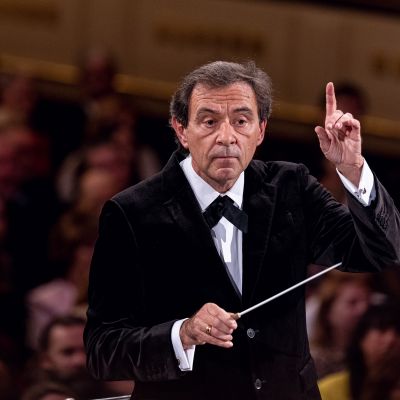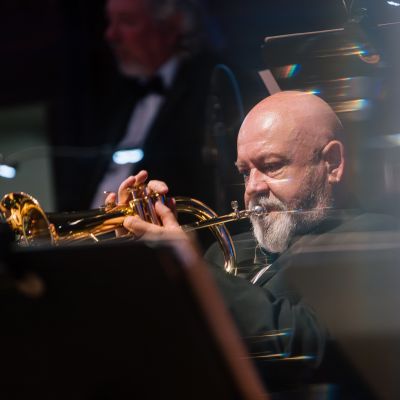Programme
Johann Sebastian Bach – Suite No. 3 in D major
Vincenzo Bellini – Concerto for Trumpet and Orchestra in E flat major
Antonio Vivaldi – Concerto for Two Trumpets and Strings in C major
Giacomo Puccini – La tregenda / Witches’ Dance from the opera Le Villi / The Fairies
Ottorino Respighi – I pini di Roma / The Pines of Rome, symphonic poem
Performers
Czech National Symphony Orchestra
Marcello Rota, conductor
Jiří Houdek, Jan Hasenöhrl, trumpets
After the opening suite, written by one of the greatest musical geniuses of all time Johann Sebastian Bach (1685–1750) for concerts given by the celebrated Leipzig ensemble Collegium musicum, the audience will be treated to two trumpet concertos.
We are familiar with Vincenzo Bellini (1801–1835) primarily as an opera composer, one of the most important representatives of the Italian bel canto. However, at the age of 22, he wrote Concerto for Oboe and Orchestra in E flat major, whose score was kept by the composer’s friend Francesco Florimo, the librarian and archivist of the monastery library in Naples, where the autograph was discovered in 1940. This work by Bellini, a master of melody, inspired a number of transcriptions; the composition on the 3rd Subscription Concert’s programme is its arrangement for trumpet, while there is also a version in existence for trombone.
Italian Baroque master Antonio Vivaldi (1678–1741), whose four violin concertos The Four Seasons endure as some of the most frequently performed pieces worldwide to this day, was a music teacher at Venice’s Ospedale della Pietà, one of the city’s four orphanages for abandoned girls. For the requirements of the institution and its semipublic performances he wrote a whole series of works, including Concerto for Two Trumpets and Strings in C major.
The sovereign music dramas La bohème, Tosca, Madama Butterfly, Turandot and others turned Giacomo Puccini(1858–1924) into one of the most famous composers of opera. Yet his first attempt, the one-act opera Le villi, failed to win any prize in a competition held in 1883 by the publisher Edoardo Sonzogno. A year later he reworked the opera into two acts and this new version was a resounding success. The opera contains two intermezzos, including La tregenda (Witches’ Dance), which we will hear at this concert.
Italian composer Ottorino Respighi (1879–1936) paid tribute to the capital city of Rome with a trilogy of symphonic poems, Fontane di Roma (Fountains of Rome), Pini di Roma (Pines of Rome) and Feste Romane (Roman Festivals). Pines of Rome from 1924 takes us on a stroll through Rome with its characteristic, fragrant trees. Children play in the shade of the pines at the Villa Borghese; the dignified pines near the historical catacombs evoke a distant era in hymnal echoes; and on Janiculum Hill the nocturnal breeze blows gently through the crowns of the pines. On the Appian Way, the remnants of a Roman road constructed in the 4th century BC, an image of the past emerges once more: to the accompaniment of brass instruments, a victorious army advances triumphantly towards the Capitolium.
After the opening suite, written by one of the greatest musical geniuses of all time Johann Sebastian Bach (1685–1750) for concerts given by the celebrated Leipzig ensemble Collegium musicum, the audience will be treated to two trumpet concertos.
We are familiar with Vincenzo Bellini (1801–1835) primarily as an opera composer, one of the most important representatives of the Italian bel canto. However, at the age of 22, he wrote Concerto for Oboe and Orchestra in E flat major, whose score was kept by the composer’s friend Francesco Florimo, the librarian and archivist of the monastery library in Naples, where the autograph was discovered in 1940. This work by Bellini, a master of melody, inspired a number of transcriptions; the composition on the 3rd Subscription Concert’s programme is its arrangement for trumpet, while there is also a version in existence for trombone.
Italian Baroque master Antonio Vivaldi (1678–1741), whose four violin concertos The Four Seasons endure as some of the most frequently performed pieces worldwide to this day, was a music teacher at Venice’s Ospedale della Pietà, one of the city’s four orphanages for abandoned girls. For the requirements of the institution and its semipublic performances he wrote a whole series of works, including Concerto for Two Trumpets and Strings in C major.
The sovereign music dramas La bohème, Tosca, Madama Butterfly, Turandot and others turned Giacomo Puccini(1858–1924) into one of the most famous composers of opera. Yet his first attempt, the one-act opera Le villi, failed to win any prize in a competition held in 1883 by the publisher Edoardo Sonzogno. A year later he reworked the opera into two acts and this new version was a resounding success. The opera contains two intermezzos, including La tregenda (Witches’ Dance), which we will hear at this concert.
Italian composer Ottorino Respighi (1879–1936) paid tribute to the capital city of Rome with a trilogy of symphonic poems, Fontane di Roma (Fountains of Rome), Pini di Roma (Pines of Rome) and Feste Romane (Roman Festivals). Pines of Rome from 1924 takes us on a stroll through Rome with its characteristic, fragrant trees. Children play in the shade of the pines at the Villa Borghese; the dignified pines near the historical catacombs evoke a distant era in hymnal echoes; and on Janiculum Hill the nocturnal breeze blows gently through the crowns of the pines. On the Appian Way, the remnants of a Roman road constructed in the 4th century BC, an image of the past emerges once more: to the accompaniment of brass instruments, a victorious army advances triumphantly towards the Capitolium.




